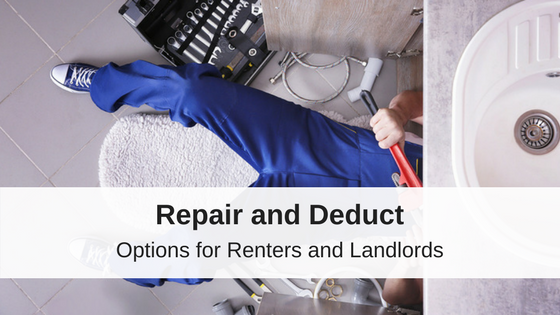
If your rental property is in need of maintenance or repairs, some state laws allow tenants to make the repair and deduct the cost of the repair from their rent, referred to as repair and deduct.
The concept of repair and deduct can be a point of contention between landlords and tenants who don’t fully understand their rights around this rental law.
Some tenants assume that any repair can qualify for repair and deduct and will attempt to fix something and simply deduct the maintenance expense from the rent. However, if the renter has not followed proper repair and deduct procedure, or if you live in state where repair and deduct is prohibited, you could find yourself in serious trouble for failing to pay your full rent amount.
Repair and Deduct Explained
Repair and deduct is the general term for when a tenant has the right to arrange and pay for a rental property repair out of their own pocket, then deduct that amount from the rent. Repair and deduct is typically done when a landlord fails to make a significant repair in a reasonable amount of time and it is affecting the health and safety of tenants or the rental property.
The reason there is so much debate around repair and deduct is because some renters just assume they can make a repair without following proper procedure or getting approval from their landlord.
Conditions for Repair and Deduct
Landlords are required to meet state regulations for implied warranty of habitability. Any property condition that threatens the safety or health of a tenant must be remedied and repaired by the housing provider to meet local health and safety standards. This usually includes having protection from the elements, access to working water and plumbing, and access to heat in the winter.
Repairs which threaten the implied warranty of habitability and make a property unlivable are typically the ones that qualify for repair and deduct. Again, this is only if your state allows repair and deduct in the first place.
Here are some examples of a maintenance issue that could qualify for repair and deduct.
- A broken heater in the winter.
- A plumbing issue that makes all toilets unusable (Note: if only one toilet is unusable, it would not count).
- Severe structural damage to the ceiling, floor, or walls.
Required maintenance cannot be the result of damage caused by the tenant or a tenant’s guest. If a repair is needed due to tenant caused damage, it would not qualify for repair and deduct but the renter would have to pay for the repair out of his own pocket.
If a rental property is in need of a repair that affects the implied warranty of habitability, a renter must follow state laws about how to notify the landlord. Typically a renter will ask his landlord for a repair via text, email, or an online maintenance portal. If the landlord fails to acknowledge the repair request or schedule a repair in a reasonable amount of time, the renter should send another request via certified mail.
If the landlord makes no attempt to make the repair in a reasonable amount of time or without a valid reason, the tenant can then take steps to contract the repair and deduct the amount from their next month’s rent.
Some states, like Texas, have further conditions stipulating that only repairs that are under $500, qualify for repair and deduct. See more on Texas repair and deduct laws.
In some states, a tenant must be current on rent in order to proceed with repair and deduct.
Not All States Allow Repair and Deduct
Not all states allow tenants to repair and deduct. According to Nolo, Alabama is one of these states which prohibits rent withholding, and repair and deduct, when a landlord fails to make important repairs that are necessary to keep the rental fit and habitable. (Ala. Code § 35-9A-164.)
Does my state allow repair and deduct?
Rental laws are created and enforced on the state and local level. To find out if you are allowed to repair and deduct from your rent, check out your state statutes on rental laws. Look for language about “tenant remedies” and specifically “repair and deduct”.
Some states only allow repair and deduct if certain conditions are met, while other states prohibit repair and deduct altogether.
After you check your state laws, check your local city and county laws. Some cities have specific ordinances and local laws that affect rental housing. Your local housing authority will be a great resource to discover what your options are if your landlord or property manager is failing to provide you with habitable living conditions.
What is rent withholding?
Rent withholding is another tenant remedy if a landlord fails to make necessary repairs to a rental property. In some cases, a renter will choose to withhold all or part of his monthly rent until a landlord repairs a major maintenance issue. Rent withholding is a different option than repair and deduct. Make sure your state allows tenants to withhold rent before attempting to do so.
Disclaimer: This article was written for informational purposes only and does not qualify as legal advice. Please consult a licensed attorney familiar with landlord-tenant laws in your state to answer any questions or concerns.